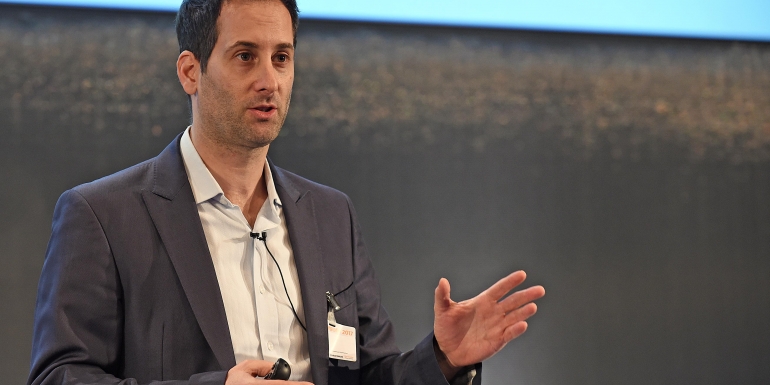It was the second time I attended the forum in Vienna (this time via the online stream) where fans of the late Peter Drucker discussed anything management in the age of digital and constant change.

With thanksgiving weekend providing a welcoming calm to my inbox, I could summarize some insights and thoughts from the forum last week.
Business Transformation
Many of the discussion points strike home with me as I have experienced them first hand when leading the transformation at Skype. With Change and Innovation intertwined, Tammy Erickson, a London based Professor, reminded us that nothing can be forced on anyone, they need to want it. Or as I put it – always opt for organic adoption.
- Traditionally, Corporate Transformation was thought of as a top down initiative, triggered from the top and cascading down to the entire organization. Well, not any more according to Gary Hamel, a management renegade, who insists that for change to stick it needs to be driven bottom-up by a “coalition of the willing”.
- Gary continues to add that “a key challenge of transformation is our need to be simultaneously radical and practical, evolutionary and revolutionary” highlighting the importance of balance when driving change and ensuring you don’t break the thing you’re trying to build/change/fix.
- Solving new problems with old principles doesn’t work, consider new ones (like total transparency, empowerment, etc..) and see what happens when they are truly taken seriously.
- Organizational change starts with the user. Not top management, not the board or the shareholders. Change needs to happen when the user is not being cared for.
Dark Data
So much has been talked about the (real) benefits of data but not enough on the side effects of our dependence on it. Julian Birkinshaw, a professor at London Business School, brings out many of the challenges of data which i consistently encounter in my line of work.
- Analysis Paralysis – timeless effort on analysing an opportunity until it has already passed. An impaired approach that raises an infinite amount of questions in order to reach the unreachable state of total certainty. Or in Julian words, looking for answers in the search of questions
- Lack of context – data without context is next to useless. To ensure we reap the benefits of data and avoid facebook style blunders, metrics need to be clearly defined and visualized with the right context.
- Driven data and not data driven – if data fails to be fully transparent it can be misused and abused by the less than ethical executives, creating an organization of driven data, driven by agenda, politics and greed which totally misses the point.
Innovation
It is widely accepted that Innovation is the prime growth engine for organizations, countries and society as a whole. It is no different in the digital age but the pace of it has increased by many folds. How to create a programmatic way for innovation to succeed in corporates was high on the agenda. Alex Osterwalder, an Author and Founder, talked about innovation theatre and the risk of innovation to the innovator..
- Innovation Theatre has become a popular show in corporation as much as The Book of Mormon is on Broadway. When ill equipped, concerned managers are pushed to create innovation in their organization, they act it out. Dressing casual, inventing titles, adopting the jargon, and opening an innovation lab or accelerator. All at the same time as ensuring Business continues to run as Usual.
- Alex continues with a disconcerting but honest depiction of innovation, calling it a career suicide in most companies today. So innovate at your own peril!
- Gary Hamel points to one of the major mistakes corporates make when trying to innovate and that is to ask a long standing bureaucratic manager to sponsor change or innovation. He compared it to asking Lebron James to replace basketball with badminton.
Dark side of Management
Change, data, innovation and culture are all directly derived from the sort of leaders and managers the company has. And besides, what is a management forum without bashing management? And rightfully so!
- Rita Gunther McGrath, a Columbia Business School Professor, calls on the abolishment of the management ivory tower. Less directing and more collaborating, more diversity and less hierarchy, and more transparency and less leading behind closed doors.
- Rita’s continues with today’s Dark Side of Management, driven by people who cannot function in a world of ambiguity and for them coming to work to lead innovation is nothing short of terrifying. The result? Innovation theatre, poor management, more bureaucracy and less ethics.
- Can Leadership be taught is one big ‘elephant in the forum’ every single year, especially with a speaker list so heavy on Academia. Rita mentioned that she can’t teach passion, empathy or an interest in people. She can, however, try to teach a manager to be more thoughtful on their actions and perhaps experiment with different approaches. Teaching for creativity is at its peak at elementary age, for most of us it starts to erode by university and eventually grows out of us completely as we enter corporations. All this points out to a highly specific skill set that is necessary for great leaders, a skill set which probably exists in a selected few than within an organizations which can explain the many poor managers we have today.
Summary – Entrepreneurial society
Tammy delivered a great line to end this summary which was that in 20 years we will become a society of entrepreneurs, as Peter Drucker himself predicted.
And if there’s anyone out there that thinks that being en entrepreneur is risky, the one thing they can take from this year’s forum is to not become one is riskier.



